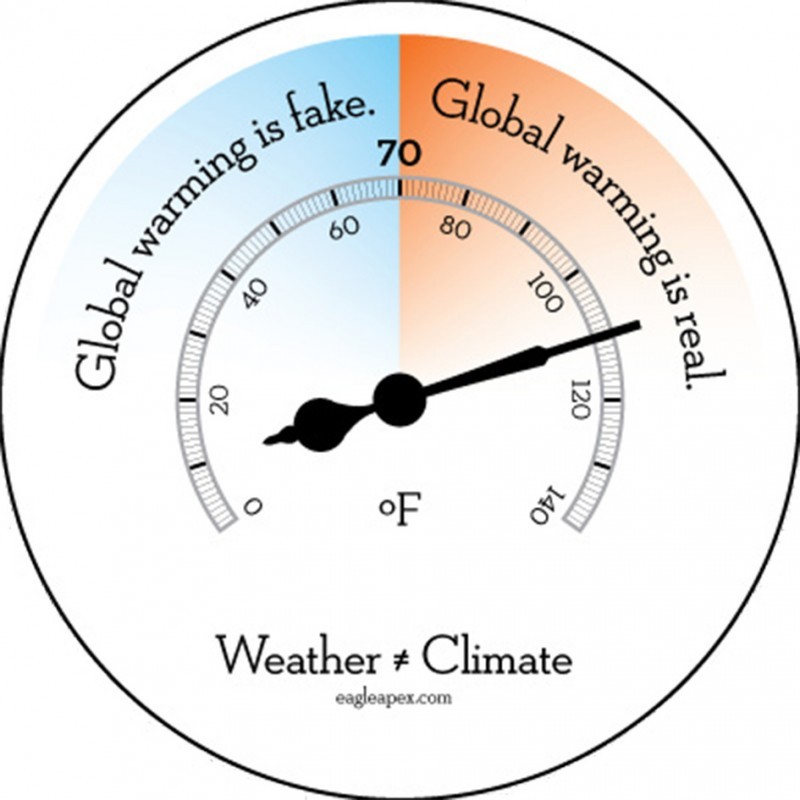Timberlake: Weather and the boulevard of annihilation
Photo courtesy of Flickr/eagleapex
Even if the theories on global warming are incorrect, it is better to err on the side of safety when playing with the fate of the entire earth.
July 18, 2012
“You think it’s hot here?” were the words I recently read on a church sign here in Ames. When the church makes light of the heat in relation to hell, then you know the sun is blazing, and the pavement is searing. Medians on Lincoln Way literally buckled out of the ground, students frolicked through the sprinklers in front of the library, and multiple people were admitted into Mary Greeley for heat exhaustion.
As of the end of June, the National Oceanic and Atmospheric Administration released its data concerning the first six months of 2012. In the 48 contiguous states, the 2012 year-to-date weather statistics show the highest recorded heat in the more than 100 years the United States has recorded temperature. The administration’s statistics also showed the last 12 months were the hottest in recorded history. June was the 14th warmest on record, April was the third warmest on record, May was the second hottest, and March was the hottest in recorded history. All the while, the summer of 2011 was the second warmest ever, and the past winter was the fourth warmest. Of the top 10 warmest 12-month periods since 1895, four of them have occurred since April 2011; and all of the top 10 are from no earlier than fall of 1999.
According to the National Climatic Data Center, the odds of this warmth occurring randomly since 1895 without a change in climate is one in 1,594,323. This means it won’t be until 124,652 A.D. that we should see another 12 month period as warm. There is some discrepancy with these odds according to different meteorologists; the lowest I have read was one in a few hundred thousand. Regardless of what the data center or other meteorologists say the odds are, this sort of weather is not supposed to be normal.
A topic of great debate in the last two or three decades is global warming. The topic has even switched sides of the aisle during that time (which is humorous in its own). The debate of whether or not it is happening no longer exists. Earth’s temperature is rising. The numbers bolster the observations. I recently spoke with a man who grew up on the border of Kenya and Tanzania, not too far from Mount Kilimanjaro. He said that when he was a child, he would stand in his yard and see the mountain completely covered with glacier and snow. Now there is hardly a snow cap. It wasn’t until this man came to America and heard the global warming debate he became convinced that was the cause. This is just one at-home example of receding glaciers and melting snow packs.
As the late Christopher Hitchens once said: “The argument about global warming is not whether there is any warming but whether or not and to what extent human activity is responsible for it. My line on that is that we should act as if it is.” This is exactly the position I feel everyone should take, regardless of your stance on the issue. He went on to powerfully state, “We don’t have another planet on which to run the experiment,” which is blatantly true. Is our ego as a species so high as to assume we are correct in our predictions, that if unappreciated, could potentially turn Earth into another Venus? Hopefully the answer is “no.”
You have undoubtedly heard some of the implications of a runaway greenhouse effect: rising sea levels, shrinking ice caps, ocean current neutrality, extreme weather and increased solar radiation, to name a few. Once it becomes “runaway,” things get scary: oxygen depletion, acidification of water and total collapse of the ecosystem.
These scenarios all seem far and gone impossible. But this is exactly what would happen experimentally if Earth lost its climate balance. Most climatologists and astronomers believe Venus is a direct example of this. What would it say about us as humanity if we let this happen?
Dan Gilbert, professor of psychology at Harvard, said in a TED talk: “If we’re not here in 10,000 years, it’s going to be because we could not take advantage of the gift given to us — because we underestimated the odds of our future pains and overestimated the value of our present pleasures.” It would say we are arrogant and inept. Do you want to be outlived by the dinosaurs 1,800 times? Let alone the cockroaches. A little shame and humility can go a long way.
It’s not about whether we are correct or not, it’s about the implications of correctness. If we are incorrect about the literal and figurative mountains of evidence then all we do is blush our cheeks and learn and nothing abominable happens. But if the evidence proves to be kosher and we fail to keep ourselves honest, then the detour to the boulevard of annihilation will be lifted, and that’s a road we don’t want to give ourselves the opportunity to cruise.







